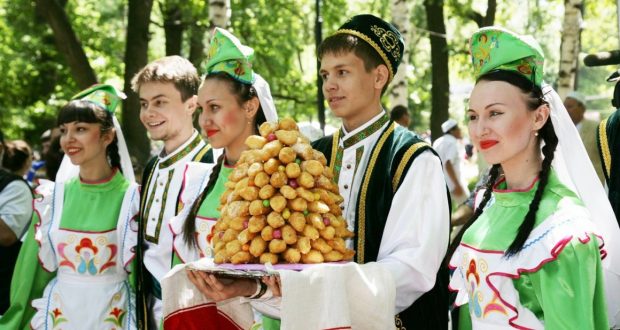Not “Who is to blame?”,
but What to do?”
Questions about position and ethnocultural
development of the Tatar ethnic group
and in the context of the results
of the VI Congress of the WCT
1. What is the situation?
The state of the Tatar nation at present
2. Evaluation criteria
What indicators can assess the state of the ethnicity of the Tatars?
Speaking native language, education in Tatar, national cultural events, national history, theater, concerts, museums, development of information systems. Books, newspapers and magazines, the growth dynamics of the broadcasting audience;
At the national level, in the country, in the regions, in places of compact residence and study, in the workplace, in the family.
3. The study and use of the Tatar language
What is the level of real bilingualism in RT and in the regions?
- In Kazan
- In Tatarstan
- In the regions of Russia, abroad
4. Barriers
What prevents the study and use of the native language?
5. Family mission
How to increase the role of the family in the formation of the personality and the preservation of national identity?
6. Morality, spirituality, customs
How to cultivate respect for elders, customs, mother tongue, culture?
7. Home, sweet home
How is work organized to cultivate love for the motherland and native land?
8. About work and order
What should be done to cultivate hard work, order?
Tatar businessmen.
9. Government programs
How are government programs implemented?
about preserving native language and identity?
Are these programs effective?
Are the results noticeable and tangible?
What needs to be done to change the situation?
10. Leading Tatar organizations
What is the work of the CGT Executive Committee and the Council of FNCAT (Federal National Cultural Autonomy of Tatars) for solving general Tatar problems and the support of your community?
How does their activity affect your life?
What changes would be helpful?
11. The Tatar world in Kazan and the Republic of Tatarstan
How the Tatar public lives in Kazan and Tatarstan?
Does it participate in national cultural projects?
12. Clubs and cultural centers
If possible, organize clubs and Tatar centers in the place of compact residence of the Tatars, at the place of study and work.
13. Tatar youth
Do you know modern projects World Forum of Tatar Youth?
What is needed for expansion networks of similar projects?
14. Circulations and ratings of Tatar media
More than 150 thousand students study at universities of RT.
There are 3,200 Tatar language teachers working in schools.
And the circulation and ratings of 1.5-2 thousand issues.
Why?
15. Tatar lessons
Why a considerable part of the Tatars parents.
Do not give children to Tatar schools and classes?
16. Mankurtstvo – ethnic amnesia
Why is a significant part of Tatar youth indifferent to the native language and the fate of their people, their republic, country? How to work with Russian-speaking Tatars and children from mixed families?
17. Mass media and youth information space
4-5 magazines for children and youth are published in RT.
But there is no youth newspaper.
No travel and computer publications.
18. Media without information and content.
The rating and circulation of the Tatar media are maintained only due to show – business, not enough social information supporting ethnic identity.
19. Where ethnoanalysts and expertise
Do you know analysts, experts on Tatar
ethnic and social humanitarian problems?
20. Historical identity
Whether publications, broadcasts are known about the history of the Tatars and Tatarstan?
Are cultural events dedicated to this topic meetings, publications and media broadcasts?
Do you know any experts on this issue?
21. Ethnocultural identity
In 2012, at the V Congress of the WCT, the Concept on the Preservation of the Identity of the Tatar People was approved, and then the state program. How are they implemented?
22. National culture and art
Do you know the 12 Tatar theaters of Tatarstan, as well as the Tatar theaters of Ufa, Tuymaza, Orenburg? With state ensembles of dances, theaters songs of popular singers? And also with Tatar museums, exhibition halls?
23. What is the estimate of the development of the Tatar nation?
What is the budget for the ethnic survival of the Tatars?
Is it possible to make an estimate of the development of the Tatars of the region, city, region and the whole of the Russian Federation?
24. How to work with the authorities?
Will the transfer of powers to decide the national culture and education of municipal and local authorities benefit?
25. Studying the Tatar language at school
What are the results and ways to optimize the study?
Tatar language in schools of RT?
Is there a need for teaching Tatar language to children of other nationalities?
26. Performance reports
Have you ever heard and seen reports on the implementation of decisions and resolutions of national forums, congresses?
27. From whom to take an example?
What interesting and important work experience has been gained at the Executive Committee of the WCT and the Council of FNCAT (Federal National Cultural Autonomy of Tatars) ? Who to learn from?
28. Each region is somehow interesting
In which regions are the bright features and characteristics of the Tatar community and their leaders visible?
29. How many of us? Growing up or down?
What is the number of Tatars in your region, district and city according to the 2002 and 2010 censuses? And now?
30. Religion and nation
How can ethnocultural organizations and religious communities interact?
Positive experience and unsolved problems.

